Matilda Mary Powick — Loved from Head to Little Toe
This article is re-printed from
The Catholic Leader, Brisbane,
with the kind permission of the editor and the author.
Christmas presents come in all shapes and sizes but, for Therese and Damian Powick, their precious gift comes with an underdeveloped foot and missing fingers on her right hand.
Matilda Mary Powick was born on November 24 with amniotic band syndrome, a rare condition that can cause deformities and sometimes amputate the limbs of a baby while it is still in the womb.
It occurs when the inner layer of the amniotic sac around the baby is damaged, allowing fibrous, band-like tissues to float around the baby, often entangling around the body and cutting off vital circulation. Matilda, the Powick’s first child, had a fifty-fifty chance of surviving the third trimester and if she did make it, was expected to be born with a dead foot.
Therese said the second half of the pregnancy was her “penance.” “It was mental anguish not knowing and being told it’s a ‘wait and see,’ that we’ll find out when she’s born,” she said. “So it was actually probably the most penance I’ve had. I learned a lot of patience.”
Pregnancy was already a difficult journey for the pair, who met in Brisbane through the Brisbane Oratory parish community. Therese had two early miscarriages since they married in 2017; it was actually a shock that they couldn’t fall pregnant straight away. “Since we got married, it was an expectation – we’re Catholic, we’ll fall pregnant,” she said. “You just sort of think it’s going to happen straight away. It’s not like that at all,” Damian said.
In January last year, Damian moved to Christchurch, accepting a job to raise money for a new cathedral to replace the Cathedral of the Blessed Sacrament, which was damaged in the 2011 and 2012 earthquakes. Therese joined him in February. “We had to move to New Zealand to fall pregnant,” she laughed. “It was something we wanted and were hoping for, so we were ecstatic when we did find out.” Aside from bad morning sickness, the first 20 weeks of the pregnancy were normal. The couple even attended the March for Life in Christchurch on August 15, with a little baby bump, in opposition to New Zealand’s abortion legislation. But they got a ‘test of faith’ two days later at the 20-week ultrasound.
The Powicks’ technician couldn’t detect blood flow through their baby’s left foot. “They thought it was a dead limb,” Therese said. “So, the doctor came in and basically said, ‘Your baby has amniotic band syndrome’.” Their baby, which they learnt at the same appointment was a little girl, had a band around her left foot and around fingers on her right hand but most critically, there was one around the umbilical cord. “The doctor said outright … your baby might not make it to the third trimester because there was one band around the umbilical cord,” Therese remembered. “It might make fifty-fifty. “Going to a pro-life march two days before really put things into perspective because we walked the walk, could we talk the talk? So, that was really a test of faith, and accepting God’s will.”
The couple were told about their ‘choices’ but Damian told the doctor: “From the get go, this baby is loved and wanted already, and they actually respected that which is quite interesting – they thought, ‘Right, we’re going to do what we can for you’,” Therese said. “It just seemed crazy to me that at the same hospital, in probably a different room, if it wasn’t wanted, that was the end. I went in for a scan each week and the professor who was looking after me, she wanted this baby to survive. We were praying for a miracle.”
The day after receiving the diagnosis, Damian asked Therese what she thought of the name Matilda. His mum had suggested they name their daughter, so if anyone wanted to say a prayer for her, they could use her name. “I was actually so full of grief, I thought, ‘Yeah, let’s just call her that’,” Therese said.
For her middle name, Therese believed, “it’s important to have Our Lady’s name somewhere. So, it was Matilda Mary,” she said. Weeks after naming Matilda, Therese’s brother-in-law asked if she knew the patron saint of feet “to save her little foot.” “I kind of laughed … and he pulled out his phone, and he goes, ‘It’s St Servatius’,” Therese said. “And that was the end of the conversation.”
A few days later, with the patron saint of feet on her mind, Therese sought to find a novena to St Servatius, and whether there was a saint named Matilda. “What we discovered was that she was a German queen who became a nun after her husband’s death, and she built a big convent and, strangely enough, she dedicated the chapel in her convent to the patron saint of feet, St Servatius,” Therese said. “When we announced to the world her name was going to be Matilda, I was worried she wouldn’t suit it. It was a sign that it was meant to be.” Suddenly, people all over the world – from Australia, Scotland, England, Canada, the United States – were praying for Matilda Mary Powick. “We even had the Tyburn Sisters up in the North Island (of New Zealand) doing a prayer crusade for us,” Damian said.
The Powicks said their daughter forced them to rethink their prayer life. “We like to say we’re devout Catholics but at the time we were pretty lazy with our prayers,” Damian said. “This was a big thing that was happening to us, and we were being pretty blasé about it. Then we heard the news, and it was like, oh man, we’ve really got to get things on track.”
Thanking God for the miracle of life, Therese was asked to have weekly scans to monitor Matilda’s oxygen and blood levels around the umbilical cord and her foot. There was “a little bit of good news” at each scan. “We can see a pinky now … her hand’s good … there’s blood flow going into the foot – that was crazy news,” Damian said. But they were also told not to get their hopes up, that Matilda would probably be born with a dead foot. “It was supposed to be detached in the womb,” Therese said.
On 24 November 2020, at thirty-four weeks, Matilda Mary Powick was born via caesarean section. She had a perfect face, and miraculously, an attached, working, but underdeveloped foot. She was also born with missing fingers on her right hand.
What really fascinated the doctors was the state of the umbilical cord. The medical team noticed Matilda had five bands wrapped around the umbilical cord, despite only detecting and monitoring one during the pregnancy. “They were quite astounded and sent it off to a lab to be researched,” Therese said. “They were fascinated with our case. And I’m thinking, ‘It’s really the work of God here.’ Not forgetting St Matilda, of course. I think she had a hand or a foot in it,” Therese said.
The couple have accepted that suffering might be a reality for their family. Matilda will most likely need reconstructive surgery on her leg, and her parents imagine there will be lots of trips to hospital. “She will suffer,” Therese said. “I think I’m learning to think that’s okay because life without suffering … well, God himself came to this world to suffer. I think that’s the basket we’ve been handed and we are okay with it. We did grow up pretty quickly, reality hit us pretty hard, and you think about the important things. It’s definitely strengthened our marriage for the better, and prayer life, and accepting that no one gets away without a little suffering, whether it’s financial, mental, or health. I’m looking forward to her coming home to be a little Christmas gift,” Therese said.
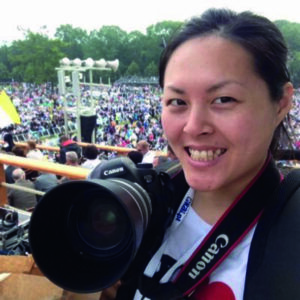
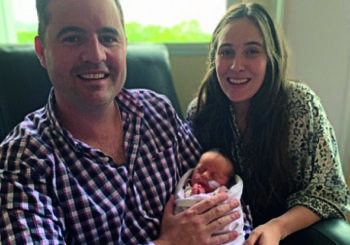
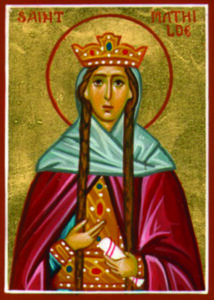
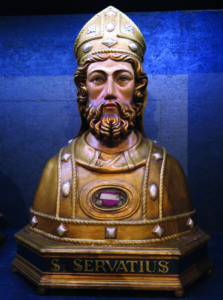
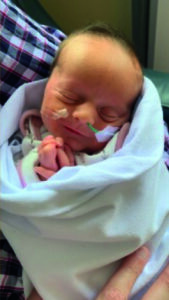
 Entries(RSS)
Entries(RSS)